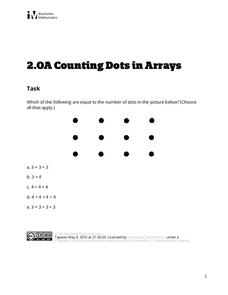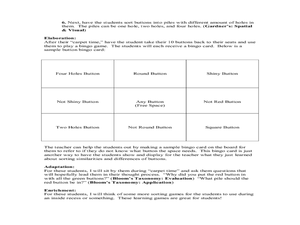Howard Hughes Medical Institute
Color Variation over Time in Rock Pocket Mouse Populations
A species-specific look at natural selection, the resource herein examines how adaptations have helped the population of rock pocket mice survive in a changing landscape. To begin, middle or high schoolers watch a 10.5 minute video,...
Illustrative Mathematics
Counting Dots in Arrays
Mathematical arrays can represent several different math skills, including counting groups, multiplication, and even area. In this specific task, learners are asked to identify the addition equations that are equal to a 3 x 4 array....
Curated OER
Grouping Buttons
Looking for a good lesson on counting and sorting? This lesson is worth a look! For this classification lesson, learners sort buttons by color, shape, shiny verses not shiny, or number of holes.
Curated OER
M&M's and the Scientific Method
Sixth graders explore the scientific method by conducting an in class experiment. In this scientific averages lesson, 6th graders discuss the concept of the scientific method, and define the different mathematical averages, mean, median...
PreKinders
Snowman Pattern Block Mat
What do a bunch of rhombuses, squares, and pentagons create? A snowman on a pattern block mat! Let young mathematicians explore shapes to create patterns in this hands-on activity worksheet.
Florida Institute of Technology
Who Owns the Zebra?
Five women of different ethnicities and living in differently colored houses own different pets, drink different beverages, and work in different professions. Who is who? Solve a logic puzzle that provides 14 clues about connections...
Illustrative Mathematics
Red and Blue Tiles
Here, second graders are tasked to find the patterns that have an even number of tiles. They are asked to think about why these patterns are even or odd and explain how they know.
Lakeshore Learning
Comparing and Ordering Fractions
Math can be satisfying for the mind and the stomach! Incorporate slices of pizza into your fractions lesson with a set of informative resources. After a brief guided lesson on comparing and ordering fractions, young mathematicians...
Curated OER
Comparing and Ordering Fractions, Mixed Numbers, and Decimals
Create your own fraction kits by folding and labeling paper using fraction vocabulary. Learners then work in groups to use these in comparing and sequencing both whole numbers and fractions. They also create unit cubes and develop an...
MENSA Education & Research Foundation
Shapes - Kindergarten
Extend scholars' learning experience with a unit consisting of five shape lesson plans, an extension activity, assessment, and rubric. Begin by reading a story about shapes, then conduct an overview and assign pupils' their first...
EngageNY
When Can We Reverse a Transformation? 3
When working with matrix multiplication, it all comes back around. The 31st portion of the unit is the third lesson on inverse matrices. The resource reviews the concepts of inverses and how to find them from the previous two lessons....
Curriculum Corner
Standard and Word Form Match
Challenge mathematicians to match 18 standard form number cards to their corresponding word form card and record their pairs on a graphic organizer.
Balanced Assessment
Genetic Codes
Determine the number of possible genetic codes. Class members are challenged to determine the number of possibilities of a genetic code that is 20 bases long. They continue to explore the average lengths of broken RNA molecules.
Curated OER
2009/2010 Coloring Calendars
In a calendar coloring activity, kids color pictures on an August 2009 calendar and answer two questions given on the calendar. The activity is part of a site with additional links, there are 12 calendars total.
Curated OER
Count the Apples & Color the Trees
In this counting and coloring activity worksheet, learners count the apples on each tree. Students color the tree brown that has the fewer number of apples and color the tree green that has more apples.
Curated OER
Number line Lane Characters-- Full Color Number 8
In this math worksheet, students learn to recognize the number 8. Students examine a full color cartoon character number 8, complete with arms and legs. This humorous page could be a poster in the classroom.
Curated OER
Symmetry of the Addition Table
Help your class discover the commutative property of addition with this exploration of the addition table. By folding and coloring the table, a symmetry is found that directs learners to an understanding of this crucial mathematical...
Curated OER
Candy Colors: Figuring the Mean, Median, and Mode
Young scholars count candy by color and then calculate mean, median, and mode. They count candy and use the data to calculate mean, median, and mode (by color) and apply their learning to another collection of data.
Curated OER
Kente Cloth
Students explore patterns and identify, extend, and translate color patterns. They discuss the origin and function of Kente cloth from Ghana, and discuss the patterns they see in students' clothing. Students color in a variety of...
Curated OER
Spark Activity: Parachute Switcheroo
Students move from one parachute to another, based on a color called out by the teacher. Students attempt to move before the teacher counts to five. Students discuss direction and moving in clockwise and counter clockwise directions.
Curated OER
Counting Colors (Four Colors)
In this counting colors worksheet, students practice their counting and color recognition skills. Students look at six groups of colored blocks in which they count the number of blocks by color.
Curated OER
Olympics - Math Facts Coloring Sheet
In this math worksheet, 2nd graders find the sums of 14 one and two digit addition problems. They read a description of the ancient Olympics and color the pictures using the color that matches the given sum.
Curated OER
The Number One
In this number 1 worksheet, students color, trace, write and spell the number 1. A reference website is given for additional resources.
Curated OER
Learning the Number 10
In this printing and counting ten worksheet, students trace the dotted examples of the word "ten". Students then count the apples in a set and circle ten.

























